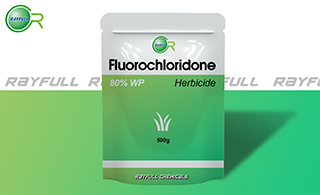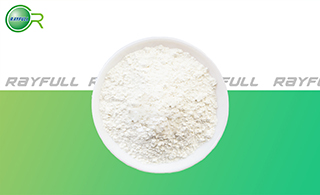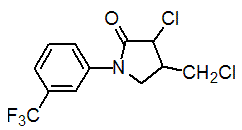FLUOROCHLORIDONE
  氟咯草酮 氟咯草酮
Introduction: A pre-emergence herbicide used to control a range of weeds in cotton; potatoes; cereals including winter rye, winter wheat; sunflowers; umbelliferous crops including carrot, celery, celeriac, parsnip.
Common name: Fluorochloridone
Another name: Flurochloridone, Flurochloridon, Raiser, Racer, etc.
Chemical name: (3RS,4RS;3RS,4SR)-3-chloro-4-chloromethyl-1-(α,α,α-trifluoro-m-tolyl)-2-pyrrolidone
Empirical formula: C12H10Cl2F3NO
Structural formula:

Mol. Weight: 312.12 g/mol
CAS No.: 61213-25-0
Specifications
Leading Fluorochloridone supplier
Fluorochloridone 80% WP
Fluorochloridone 95% TC
Packing:
BULK PACKING
Solid: 25kg/Bag, 25kg/Drum, 50kg/Drum etc.
SMALL PACKING
Solid: 1kg/Alu bag, 500g/Alu bag, 200g/Alu bag, 100g/Alu bag, 50g/Alu bag, 15g/Alu bag etc.
Customerized packing label
Fluorochloridone FAO standard
Professional registration
HAZARDS IDENTIFICATION
Hazard statement(s)
H302 (27.54%): Harmful if swallowed.
H317 (27.54%): May cause an allergic skin reaction.
H361 (100%): Suspected of damaging fertility or the unborn child.
H400 (100%): Very toxic to aquatic life.
H410 (100%): Very toxic to aquatic life with long lasting effects.
H411 (66.67%): Toxic to aquatic life with long lasting effects.
Precautionary statement(s)
P201: Obtain special instructions before use.
P202: Do not handle until all safety precautions have been read and understood.
P261: Avoid breathing dust/fume/gas/mist/vapors/spray.
P264: Wash ... thoroughly after handling.
P270: Do not eat, drink or smoke when using this product.
P272: Contaminated work clothing should not be allowed out of the workplace.
P273: Avoid release to the environment.
P280: Wear protective gloves/protective clothing/eye protection/face protection.
P281: Use personal protective equipment as required.
P301+P312: IF SWALLOWED: call a POISON CENTER/doctor/... IF you feel unwell.
P302+P352: IF ON SKIN: wash with plenty of water.
P308+P313: IF exposed or concerned: Get medical advice/attention.
P321: Specific treatment (see ... on this label).
P330: Rinse mouth.
P333+P313: IF SKIN irritation or rash occurs: Get medical advice/attention.
P363: Wash contaminated clothing before reuse.
P391: Collect spillage.
P405: Store locked up.
P501: Dispose of contents/container to ...
Supplemental Hazard Statements: none
MAMMALIAN TOXICOLOGY
Acute toxicity: 1) Acute oral LD50 for rat: >2150 a.i.mg/kg. 2) Acute dermal LD50 for rat: >5000 a.i.mg/kg. 3) Inhalation LC50 (4 h) for rat: >4.82 a.i.mg/L. 4) Practically non-irritating to skin (rabbits). 5) Non-irritating to eyes (rabbits). 6) Not a skin sensitiser (guinea pigs).
NOEL: (2 y) for male rats is 100 mg/kg diet (3.9 mg/kg b.w. daily), female rats is 400 mg/kg diet (19.3 mg/kg b.w. daily). Genotoxicity: negative.
ADI: 0.04 mg/kg b.w./day [Rat, SF=100]
Classification:
Toxicity class WHO (a.i.): III (Slightly hazardous)
EC Risk Classification: Reproduction risk category 3: R62/63; Xn - Harmful: R22; N - Dangerous for the environment: R51, R53
ECOTOXICOLOGY
Effect on birds: low toxicity to birds, acute oral LD50 for Bobwhite quail is >2150 a.i.mg/kg. Effect on fish: moderate toxicity to fish, acute 96 hour LC50 for Rainbow trout is 3.0 a.i.mg/L. Effect on aquatic invertebrates: moderate toxicity to aquatic invertebrates, acute 48 hour EC50 for Daphnia magna is 5.1 a.i.mg/L. Effect on algae: high toxicity to algae, acute 72 hour EC50 for Scenedemus subspicatus is 0.0047 a.i.mg/L. Effect on honeybees: moderate toxicity to honeybees, contact acute 48 hour LD50 is 100 a.i.μg/bee; oral acute 48 hour LD50 is 100 a.i.μg/bee. Effect on earthworms: moderate toxicity to earthworms, acute 14 day LC50 for Eisenia foetida is >227 a.i.mg/kg.
ENVIRONMENTAL FATE
Animals: Flurochloridone is extensively metabolised and rapidly excreted in rats; >95% of orally applied dose was excreted in 90 h. Metabolism by oxidation, hydrolysis and glutathione conjugation yielded numerous metabolites in urine and faeces. Plants: Flurochloridone is rapidly metabolised in plants. Numerous minor metabolites are formed through oxidation and conjugation. Residue levels of flurochloridone in crops are generally <0.05 mg/kg. Soil/Environment In the lab., flurochloridone is readily degraded in soil, mostly forming CO2 and a bound residue; DT50 (3 soil types, aerobic, 28 °C) 4, 5 and 27 d; two metabolites were formed, which were readily degraded further. In aerobic sediment, flurochloridone degraded with DT50 3-18 d (2 soils). In the field, DT50 9-70 d. Koc 680-1300, Kd 8-19, indicating low potential mobility on the McCall classification scale; flurochloridone does not leach because it is adsorbed and readily degraded in soil. For water, see Stability.
Usage: Herbicide reported by F. Pereiro et al. (Proc. Br. Crop Prot. Conf. - Weeds, 1982, 1, 225). Introduced by Stauffer Chemical Co. (now Syngenta AG) in 1985. Rights acquired by Agan Chemical Manufacturers Ltd in 2002. Patents: DE 2612731 Manufacturers: Agan. Inhibits synthesis of carotenoids (which prevent chlorophyll from undergoing photo-oxidation) by inhibition of phytoene desaturase.
Application: Selective herbicide, absorbed by the roots, stems, and coleoptiles. Applied at 250-750 g/ha pre-emergence to control a wide range of weeds in sunflowers, carrots and other umbelliferous crops; Stellaria media, Veronica hederifolia and Viola arvensis in winter wheat and winter rye; Galium aparine, Solanum nigrum and Veronica persica in potatoes.
| 






